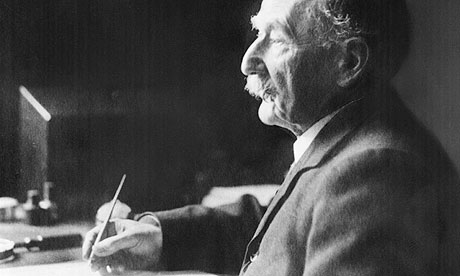
When I was growing up in Dorset, not far from "Casterbridge" , I went through a Hardy phase, reading everything from Under The Greenwood Tree to The Dynasts, his verse play, set in the Napoleonic wars. Briefly, yes, I became quite obsessed.
Anyway, the county museum in Dorchester became a kind of shrine to my devotion. Somewhere in the depths of its gloomy, hushed interior was a replica of the writer's study with his desk, his pens and inkpot, his pince-nez spectacles; in fact, all the things he left behind at his death (from pleurisy) in 1928. Next to his books (rows of leather-bound Macmillan editions) the bric-a-brac on Hardy's desk became the real focus of my interest, a vivid window onto the solitude and silence of the writer's life in old age.
The Dorset County Museum, which still celebrates the accumulated treasures of one of England's richest counties, flashed into mind last Friday when the Harry Ransom Center in Texas announced its acquisition of John Fowles's writing desk, to be exhibited to the world on the writer's 85th birthday. Fowles was not a Dorset native like Hardy, but he lived for many years on the coast at Lyme Regis. He died in 2005, after a series of strokes.
For the archivists of Texas, the appeal of Fowles's desk (they already have his manuscripts) is that they can exhibit its contents: the single Tic Tac mint, the silver fountain pen and the spare HMV gramophone player needles. There's also a plastic typewriter ribbon canister containing seeds and petals and a note "Nicotinia 1963", which presumably derives from the years Fowles worked on The Magus.
I'm not sure that any of this leaves us any the wiser about Fowles but it does underline something about the future of libraries and literary museums. In the age of the laptop, ebook and memory stick, it will be the non-literary artefacts that will attract attention. There's even the beginnings of an academic discipline emerging around such material. See, for instance, Sam Gosling's "Snoop: What Your Stuff Says About You".
It's true that great archives like the Harry Ransom (and the Bodleian) do boast departments whose function is to curate writers' discarded hard drives. However, compared to the great manuscripts of the past, this is dull, unrevealing stuff. Perhaps the future lies with brass knuckles, dried seeds and fossilised Tic Tacs.

